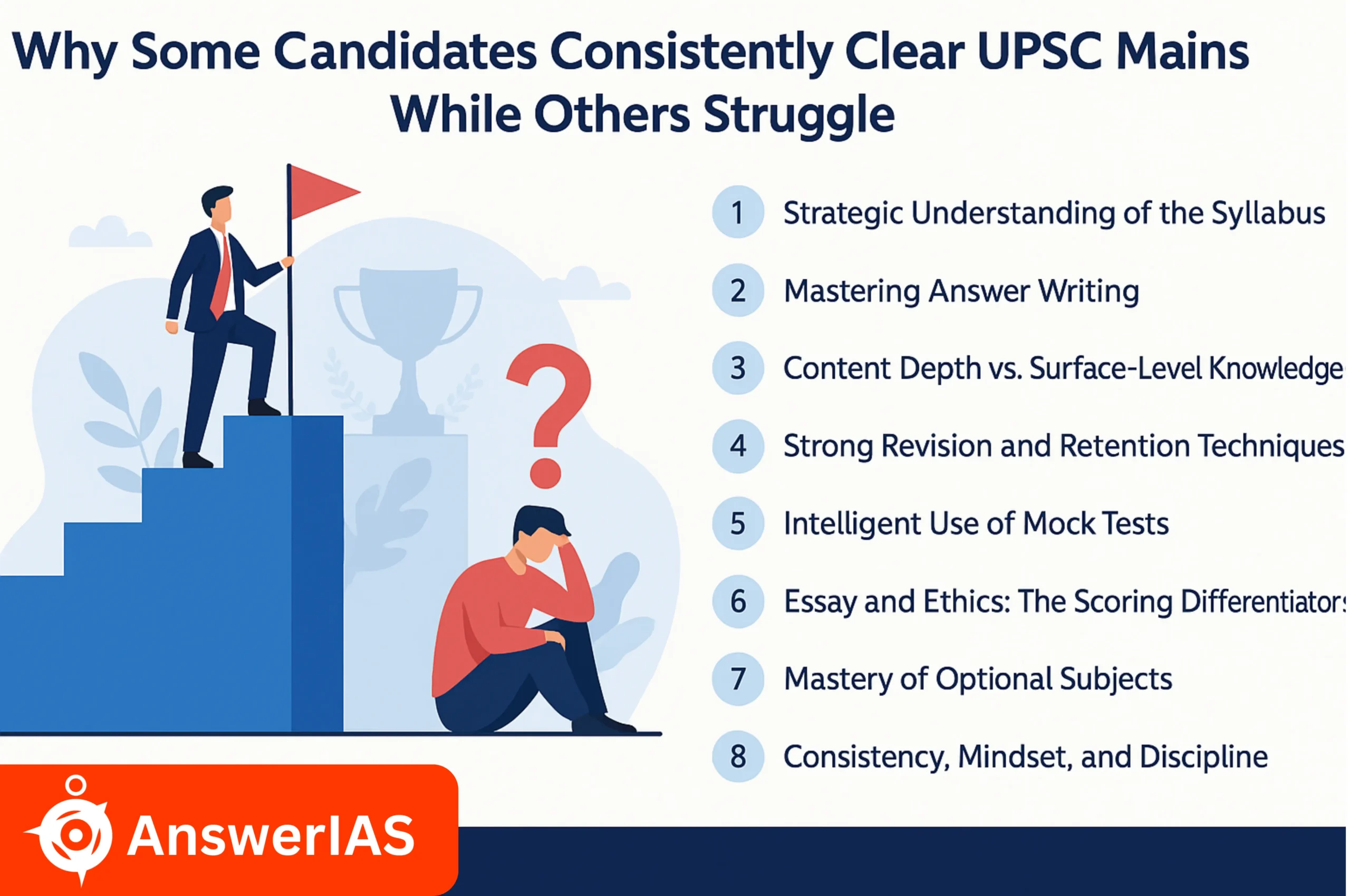
Passing the UPSC Civil Services Mains Examination is one of the toughest challenges in India’s competitive exams. Every year, thousands of aspirants clear the UPSC Prelims, only to fall short in the Mains. So, what sets apart the successful candidates who clear the UPSC Mains 2025 and beyond? What consistent strategies do they adopt that others miss?
Let’s examine what makes successful Mains qualifiers different from those who keep having difficulties. Some people try many times but still struggle.
Understanding the UPSC Mains Examination
The UPSC Mains is a vital stage in the UPSC Civil Services Examination (CSE). Tests check not only factual knowledge but also depth and writing skills. They measure the ability to present clear arguments within a set time.
Unlike Prelims, which are objective and qualifying, Mains are subjective and determine your score for the interview.
Key Factors That Help Candidates Clear UPSC Mains Consistently
1. Strategic Understanding of the Syllabus
The UPSC syllabus isn’t just a list—it’s a blueprint. Toppers strategically decode each part of the GS papers, Essay, and Optional subjects.
a. Successful Strategy:
- Aligning static portions with current affairs.
- Creating inter-connected notes that map the economy, environment, governance, and more.
- Regularly updating notes with recent developments from UPSC CSE 2024 and UPSC Prelims result 2025.
“The syllabus is your Bible. Mastering it line by line can be your biggest strength.” – Tina Dabi, UPSC Topper
b. Common Mistake:
- Preparing topics in isolation.
- Ignoring the cross-linkages in the syllabus.
- Overlooking updates relevant to UPSC Mains 2025.
c. Mastering Answer Writing
The core of UPSC Mains success lies in answer writing. Even the best-prepared candidates falter without structured presentation.
d. Successful Strategy:
- Clear introduction, logical body, and balanced conclusion.
- Usage of flowcharts, maps, and data.
- Including government reports, Yojana articles, and examples from real events.
e. Common Mistake:
- Writing generic or unstructured answers.
- Ignoring the specific demand of the question.
- Poor time management leads to unanswered questions.
3. Content Depth vs. Surface-Level Knowledge
Clearing civil services mains examination demands both breadth and depth.
a. Successful Strategy:
- In-depth preparation of critical topics such as poverty, climate change, and internal security.
- Multiple-source approach, integrating insights from coaching materials, PIB, and standard books.
b. Common Mistake:
- Relying only on toppers’ notes or summary booklets.
- Missing out on analytical angles and real-world examples.
4. Strong Revision and Retention Techniques
Retention is key in writing high-quality answers quickly and effectively.
a. Successful Strategy:
- Using spaced repetition and mind maps.
- Organising notes for quick reference before exam date.
- Integrating insights across topics.
b. Common Mistake:
- Random revision without structure.
- Cramming before the exam instead of periodic review.
5. Intelligent Use of Mock Tests
Mock tests simulate the exam environment and help fine-tune strategy.
a. Successful Strategy:
- Practising full-length tests under timed conditions.
- Analysing mock test feedback in detail.
- Focusing on consistent improvement rather than just marks.
b. Common Mistake:
- Taking mocks irregularly.
- Ignoring answer reviews or repeating old errors.
- Over-emphasizing scores instead of learning.
6. Essay and Ethics: The Scoring Differentiators
These papers often help a successful candidate stand out from others, especially when results are declared.
a. Essay Paper:
- Clear structure with introduction, multiple perspectives, and impactful conclusion.
- Integration of examples from history, governance, economy, and international affairs.
b. Ethics Paper:
- Logical structure in case studies.
- Application of ethical theories with real-life examples.
- Balanced administrator-like answers over moral preaching.
7. Mastery of Optional Subjects
The Optional subject can be a game changer in the UPSC Mains result.
a. Successful Strategy:
- Thorough syllabus coverage and concept clarity.
- Answer writing practice from previous year papers.
- Staying current for subjects like PSIR, Geography, or Sociology.
b. Common Mistake:
- Delayed or incomplete optional preparation.
- Ignoring trends in questions.
- Lack of personal notes and revision cycles.
8. Consistency, Mindset, and Discipline
Mental resilience is as critical as academic preparation in the public service commission UPSC journey.
Successful Strategy:
- Sticking to a fixed schedule.
- Learning from mistakes without demotivation.
- Keeping the long-term vision in mind rather than obsessing over results.
“I failed twice, but every failure refined my preparation and made me stronger.” – Gaurav Agrawal, UPSC Rank 1
Common Mistake:
- Burnout because of erratic routines of the student.
- Emotional breakdowns during personality test interviews.
- Neglecting physical health and mental well-being.
Conclusion: How to Truly Crack UPSC Mains
To consistently clear the Union Public Service Commission Mains Examination, aspirants need more than just hard work. Strategic preparation, focused answer writing, subject mastery, and emotional discipline form the core of UPSC success.
If you’re targeting UPSC CSE 2024, now is the time to correct common pitfalls and build your plan toward success in Prelims, Mains, and Interview stages.

Comments (1)
UPSC Civil Service Exam : When Should You Start Preparing for comfortably ? - AnswerIASsays:
June 20, 2025 at 7:16 pm[…] Why Some Candidates Clear UPSC Mains While Others Struggle ? […]